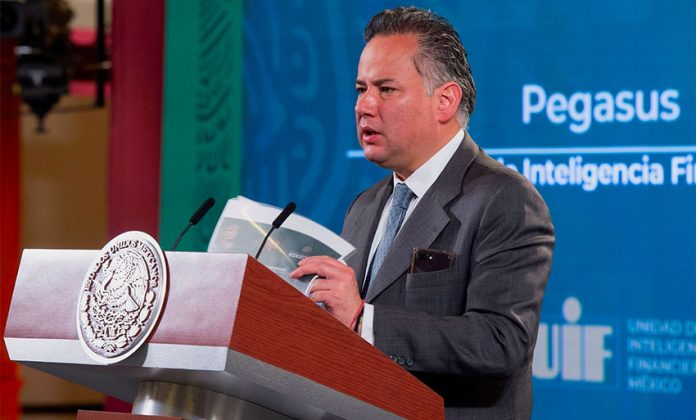The governments led by former presidents Felipe Calderón and Enrique Peña Nieto spent approximately US $300 million between 2012 and 2018 to purchase spyware from the Israeli company NSO group, the head of the Finance Ministry’s Financial Intelligence Unit (UIF) said Wednesday.
The outlay on spyware programs such as the Pegasus suite, which can infiltrate mobile telephones, apparently included payments that were funneled back to ex-government officials as kickbacks.
UIF chief Santiago Nieto told President López Obrador’s regular news conference that information about the alleged kickback scheme is being forwarded to the Attorney General’s Office (FGR).
The amounts paid for spyware programs and the way in which they were paid suggests the presence of corruption in the form of an embezzlement scheme involving front companies, he said.
“This implies or at least presumes the existence of acts of corruption, by selling [the spyware] at inflated prices to the government between the years 2012 and 2018,” Nieto said.
Journalists, activists, opposition figures and others, including at least 50 people close to President López Obrador, were potentially targeted with Pegasus by the Peña Nieto government, which took office in December 2018.
All told, “more than 15,000 individuals [were] selected as possible targets for surveillance between 2016 and 2017,” the newspaper The Guardian reported this week.
“… Mexico was the first country in the world to buy Pegasus from NSO and became something of a laboratory for the spy technology, which at the time was in its infancy.”
Nieto said that no spyware transactions have been detected during the administration of López Obrador, who described spying that may have targeted him and his close associates as “shameful.”
He has vowed not to use spyware or spy in any other way on government opponents, but some journalists claimed last month they have been targeted by his administration. In addition, the newspaper El País reported in April that the FGR spent at least US $5.6 million during the past two years on software that allowed it to conduct cell phone and internet espionage on a massive scale.
Among the government departments that bought and/or operated Pegasus during the previous two governments were the Defense Ministry, the federal Attorney General’s Office (when it was known as the PGR) and the now-defunct Center for Investigation and National Security.
![]()
PGR purchase contracts were signed by Tomás Zerón, who headed up the now-defunct Criminal Investigation Agency in the Peña Nieto administration, the FGR said in a statement this week. Zerón is accused of abduction, torture and tampering with evidence in the investigation into the disappearance of 43 students in Guerrero in 2014 but is currently in Israel.
Israel’s ambassador to Mexico, Zvi Tal, said Tuesday that Mexico’s application for his extradition was moving forward after reports indicated that the process was delayed due to a strained relationship between the two countries.
The FGR also said that a Mexican company, KBH Track, had used Pegasus.
“… Said manufacturing company carried out telephone espionage for different applicants that have not yet been fully identified,” it said. The FGR said that prominent journalist Carmen Aristegui, a target of spying herself, assisted it with its investigations into the use of Pegasus by KBH Track.
It said the telephone of former national security commissioner Manuel Mondragón was confirmed to have been infiltrated and his conversations with Interior Ministry and security officials, among others, were recorded.
The FGR added that it hoped that other people potentially targeted with Pegasus would provide their telephones to determine if they were in fact victims of espionage.
If Pegasus successfully infiltrates a phone by getting its owner to click on a link contained in a message it can monitor calls, texts, email and contacts and use the device’s microphone and camera for surveillance.
“Mexico’s capacity to spy on its citizens is immense. [And] it’s extremely easy for the technology and the information obtained through the spyware to fall into private hands – be it organized crime or commercial,” Mexico City security consultant Jorge Robelledo told The Guardian. “What we know about is only the tip of the iceberg.”
